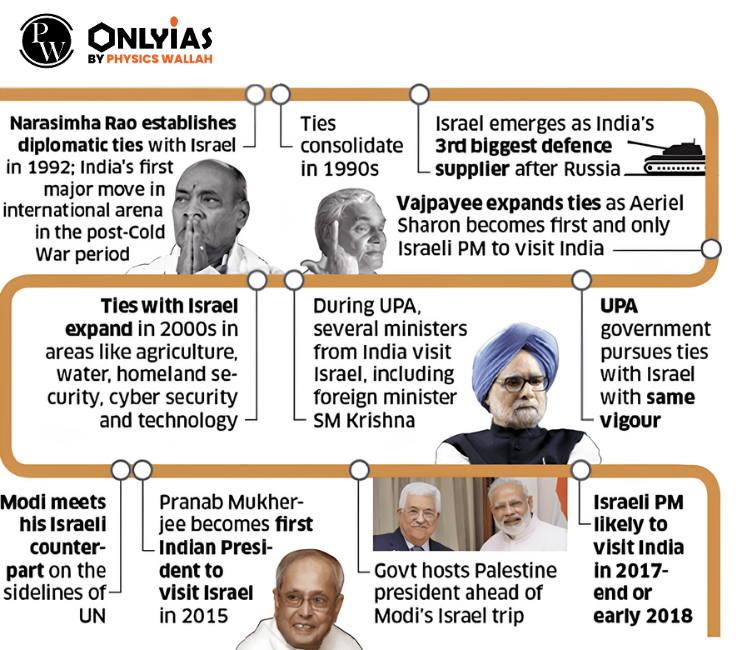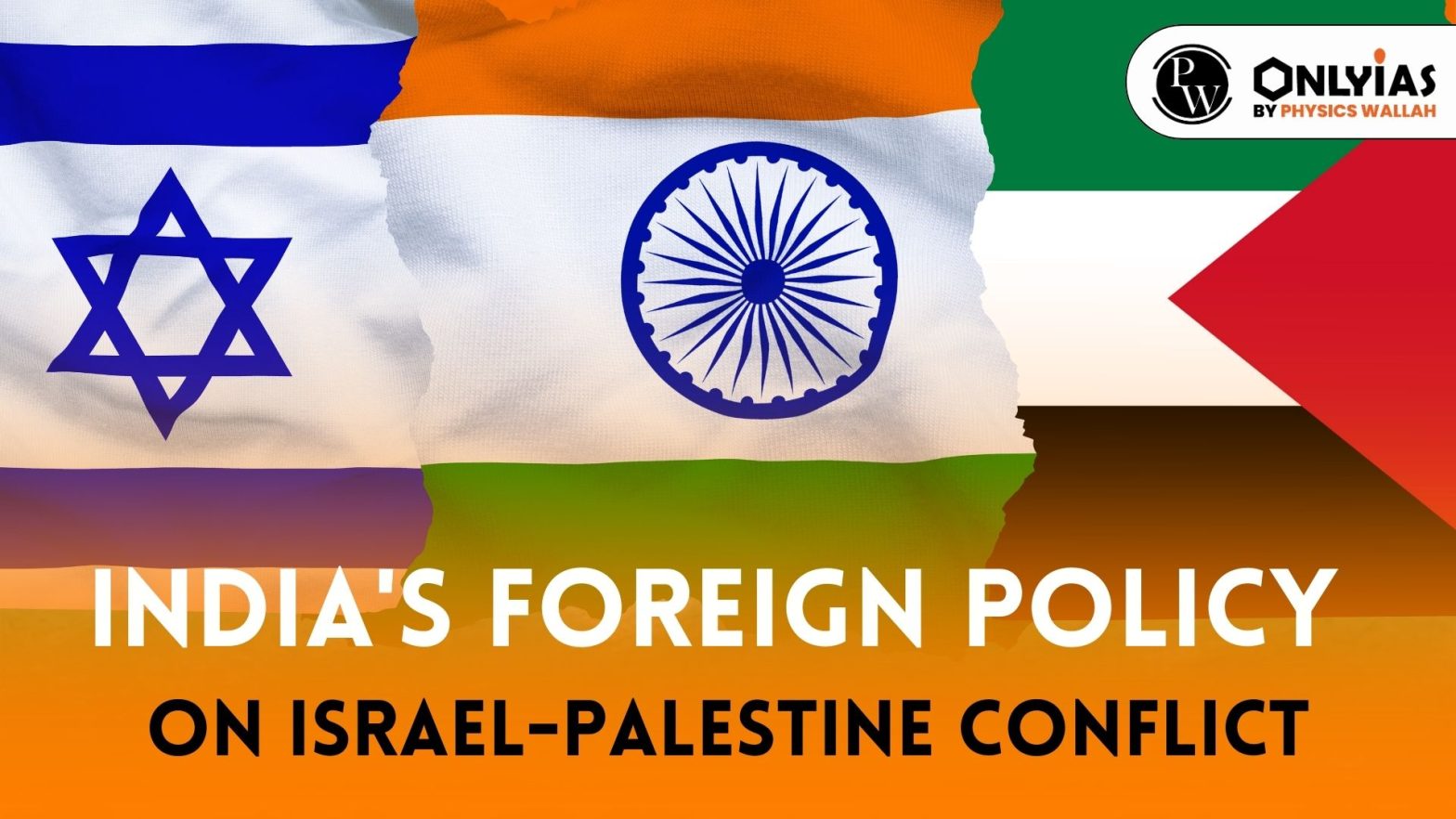Context:
India’s Foreign Policy Stand Against Israel (Phase 1; 1947-1950)
- Factors: India’s foreign policy stance on the establishment of the State of Israel was affected by many factors, including India’s own partition on religious lines, and India’s relationship with other nations.
- Views of Leaders
- Mahatma Gandhi believed the Jews had a good case and a prior claim for Israel but opposed the creation of Israel on religious or mandated terms.
- Jawaharlal Nehru: Albert Einstein wrote a four-page letter to Jawaharlal Nehru on June 13, 1947, to persuade India to support the setting up of a Jewish state. Nehru, however, couldn’t accept his request, and explained his dilemma stating that national leaders have to “unfortunately” pursue policies that are “essentially selfish”.
- Against voting in the United Nations: India voted against the Partitioning of Palestine plan of 1947 and voted against Israel’s admission to the United Nations in 1949.
- Supported by Indian Fractions:
- Various proponents of Hindu nationalism supported or sympathized with the creation of Israel.
- Hindu Mahasabha leader Vinayak Damodar Savarkar supported the creation of Israel on both moral and political grounds, and condemned India’s vote at the UN against Israel.
- Rashtriya Swayamsevak Sangh leader Madhav Sadashiv Golwalkar admired Jewish nationalism and believed Palestine was the natural territory of the Jewish people, essential to their aspiration for nationhood.
Learn More about India’s Foreign Policy For the UPSC Exam.
India’s Foreign Policy Stand: Informal recognition of Israel (Phase 2; 1950–91)
- Recognition: On 17 September 1950, India officially recognized the State of Israel.
- Consulate in India: In 1953, Israel was permitted to open a consulate in Bombay (now Mumbai).
- Informal Relations: From India’s recognition of Israel in 1950 to the early 1990s, the relationship remained informal in nature.
India’s Foreign Policy Stance on Palestinian Self-Determination
- Faith of Four Decades: The relationship with Palestine was almost an article of faith in India’s foreign policy for over four decades.
- Support in the United Nations: At the 53rd UN session, India co-sponsored the draft resolution on the right of the Palestinians to self-determination.
- Criticism to Israel: In the 1967 and 1973 wars, India criticized Israel as the aggressor.
- Recognition to Representative: In 1975, India became the first non-Arab country to recognize the Palestine Liberation Organization PLO as the sole representative of the Palestinian people, and invited it to open an office in India, which was accorded diplomatic status five years later.
- Recognition to Capital: In 1988, when the PLO declared an independent state of Palestine with its capital in East Jerusalem, India granted recognition immediately.
- Acceptance of Two-State Solution: India remained firmly on the side of the PLO, which was seen as ready for a political solution, and had accepted the two-state solution.
- Vote in UNESCO: It voted for Palestine to become a full member of UNESCO in 2011, and a year later, co-sponsored the UN General Assembly resolution that enabled Palestine to become a “non-member” observer state at the UN without voting rights.
- India also supported the installation of the Palestinian flag on the UN premises in September 2015.
Examining the Shifts in India’s Foreign Policy Landscape (Phase 3; 1991- Till-Now)
- Blocking of India’s membership in OIC: The formation of an Organisation of Islamic Cooperation (OIC) in 1969 which neglected the sentiments of Indian Muslims by blocking India’s membership to this group by Pakistan is one of the significantly influenced a shift in India’s foreign policy stance.
- No support on Kashmir Issue: India has received no backing from the Arab countries on the Kashmir Issue.
- No support against Cross-Border Insurgency: There have been no serious attempts by the Arab world to put pressure on Pakistan to reign in the cross-border insurgency in Kashmir.
- Support by Israel: Israel supported India during the Indo-Pak wars even before full diplomatic ties were established.
- Ties with the US: With the collapse of the Soviet Union and the rise of the US as a superpower, India started aligning itself with the US and this further added to our improved relations with Israel.
- After decades of Non-Alignment and Pro-Arab policy, India’s foreign policy changed in 1992 when it decided to establish full diplomatic relations with Israel.

India’s Foreign Policy Shift: 2018 Prime Ministerial Visit to Israel
- Visit to Israel: In February 2018, the first Indian Prime Minister visited Israel.
- Policy of De-hyphenation: India stated about the “de-hyphenated” relationship, means India would deal with each country separately.
- In fact, the de-hyphenation is actually a careful balancing act, with India shifting from one side to another as the situation demands.
- Improving ties with Arab Countries: Meanwhile, India continues to improve ties with Arab countries, especially Saudi Arabia and the UAE, and feels vindicated by the decision of some Arab states to improve ties with Israel.
Also read: India-Israel Bilateral Relations
Conclusion
India’s foreign policy has undergone a significant evolution. From not recognizing Israel to becoming friends, and now balancing relations with different countries, it shows how India adapts and tries to keep things fair in the world.
| Attempt the PY Prelims Question
Amnesty International is
- An agency of the United Nations to help refugees of civil wars
- A global Human Rights Movement
- A non-governmental voluntary organization to help very poor people
- A inter-governmental agency to cater to medical emergencies in war-ravaged regions
Ans: B |
![]() 10 Oct 2023
10 Oct 2023

